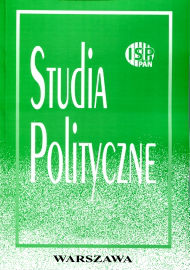Rola ekspertów w zarządzaniu gospodarką PRL w latach siedemdziesiątych
The role of experts in managing the economy of the People’s Poland in the 1970s
Author(s): Łukasz DwilewiczSubject(s): Politics / Political Sciences
Published by: Instytut Studiów Politycznych PAN
Keywords: Edward Gierek; Zdzisław Rurarz; Paweł Bożyk; Piotr Jaroszewicz; Mieczysław Jagielski; Tadeusz Pyka; Tadeusz Wrzaszczyk;
Summary/Abstract: The text is dedicated to the role of those people who had no formal entitlement to make decisions but, because of their professional achievements (mainly in science), enjoyed prestige in articulating the current or long-term policy of the party and the state authorities in the 1970s. The factors which increased the demand for the services of experts included the awareness of a scientific and technological revolution underway in the developed countries, resulting in support for consulting procedures, something which can be observed in the most important programmatic documents of the PUWP, as well as in the duplicated power structures of the party and the state. A yardstick which may be used to measure the impact of the expert bodies on the actions of state and party authorities is provided by the quantity and nature of the documents submitted to the deliberations of particular bodies of the party and the state. In the case of the state, the decision-making bodies were the Council of Ministers and the Presidium of the government; in the case of the party, it was the Politburo of the Central Committee of the PUWP. In general, it may be said that they were not the primary recipients of papers generated by the various types of experts. Such papers were put to use more at a lower level (e.g. that of particular ministries) or in the offices of their particular members (e.g. that of Edward Gierek). The most renowned case of experts being brought in to the decision making process by the centre of power was the appointment, in 1971, of an economic advisor to the 1st Secretary of the Central Committee of the PUPW, in the person of Mr. Zdzisław Rurarz (formally, he was given a full-time position as an inspector at the CC); he was later to be replaced by Professor Paweł Bożyk. In May 1997, an entire team of scientific advisors to the 1st Secretary was appointed, chaired by Professor Bożyk. It may be said that the influence of the advisors to the 1st Secretary was scant; this resulted, to a large degree, from the concentration of the most of the decision-making power, as far as the economy was concerned, in the hands of Prime Minister, Piotr Jaroszewicz, and the deputy Prime Ministers who reported to him i.e., Mieczysław Jagielski and (in the years when the team of advisors was active), Tadeusz Pyka and Tadeusz Wrzaszczyk. The fact that the management of the economy was dominated by the government implied that the greatest influence was held by specialists from within its own structures, namely the lower rank clerks and the directors of the industrial groups and enterprises who acted en masse and drafted documents to meet the needs of their supervisors. Paradoxically, the activity of the team of advisors proved most significant for the further career of some of its members in the state and party structures.
Journal: Studia Polityczne
- Issue Year: 2009
- Issue No: 24
- Page Range: 7-46
- Page Count: 40
- Language: Polish

